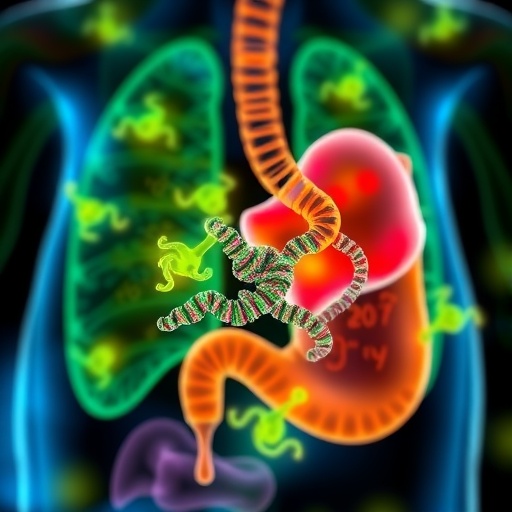
In a groundbreaking discovery unveiled by researchers at the University of California, San Francisco, a pivotal protein known as PCSK9 has been identified as a key determinant in the metastatic behavior of pancreatic cancer cells. This new insight sheds light on the remarkable ability of pancreatic tumors to selectively colonize distant organs such as the lungs and liver, organs whose microenvironments differ drastically, presenting unique challenges to invading cancer cells. Understanding the molecular mechanisms enabling these cells to adapt and thrive in such hostile terrains opens exciting avenues for targeted therapies in one of the most lethal and treatment-resistant forms of cancer.
Pancreatic cancer is notorious for its aggressive nature and propensity for early metastasis, often spreading before patients experience overt symptoms. This metastatic spread to organs like the lungs and liver dramatically reduces survival rates, primarily because therapeutic interventions at this stage are largely ineffective. The UCSF team sought to uncover the biological underpinnings that enable metastatic pancreatic cancer cells to not only survive but also flourish in these distinct anatomical sites, despite the vastly different metabolic and environmental conditions they present.
At the center of their research lies PCSK9, a protein traditionally recognized for its regulatory role in cholesterol metabolism through the modulation of low-density lipoprotein receptors. The researchers employed comprehensive genomic analyses, leveraging data from MetMap, a large-scale metastatic dependency map project at the Broad Institute, to identify pancreatic cancer cell lines that exhibit consistent tropism either for lung or liver metastasis. Their challenge was to elucidate why certain cancer cells favor one organ over the other and how their molecular makeup supports this selective colonization.
.adsslot_nLX6bJET2c{ width:728px !important; height:90px !important; }
@media (max-width:1199px) { .adsslot_nLX6bJET2c{ width:468px !important; height:60px !important; } }
@media (max-width:767px) { .adsslot_nLX6bJET2c{ width:320px !important; height:50px !important; } }
ADVERTISEMENT
The study’s findings revealed that the differential expression of PCSK9 governs two distinct metabolic adaptations within metastatic pancreatic cancer cells. When PCSK9 expression is low, tumor cells preferentially scavenge extracellular cholesterol—a resource readily abundant in the liver’s nutrient-rich microenvironment. Conversely, elevated PCSK9 levels prompt cancer cells to synthesize cholesterol autonomously, an adaptation that confers significant survival advantages in the oxygen-rich, cholesterol-scarce milieu of the lungs. This intrinsic cholesterol biosynthesis is accompanied by enhanced production of antioxidant molecules that mitigate oxidative damage, a critical survival mechanism in the pro-oxidant environment of pulmonary tissue.
To probe this mechanism further, the researchers engineered pancreatic cancer cells originally predisposed to colonize the liver to overexpress PCSK9. Remarkably, this genetic manipulation redirected these cells toward lung colonization, confirming that PCSK9 is a master regulator enabling pancreatic cancer cells to reprogram their lipid metabolism and modulate their metastatic destination. These results suggest that PCSK9 not only facilitates metabolic flexibility but decisively influences the organotropism of pancreatic tumor cells.
The implications of these discoveries are profound, as they challenge the traditional view of metastatic spread being determined solely by anatomical and physical factors. Instead, they highlight how metabolic reprogramming, orchestrated by proteins such as PCSK9, equips cancer cells with the necessary tools to survive, adapt, and proliferate in radically different organ environments. This metabolic plasticity opens a therapeutic window where interventions that disrupt cholesterol acquisition pathways could sensitize metastatic pancreatic cancer cells to treatment and potentially prevent their organ-specific colonization.
Rushika Perera, PhD, the senior author of the study, emphasized the therapeutic potential of these findings, stating that targeting PCSK9-mediated pathways offers a promising strategy to impair metastatic progression. By interfering with cholesterol homeostasis within cancer cells, oncologists may develop novel pharmacologic agents capable of halting or redirecting the spread of pancreatic tumors, which historically demonstrate limited responsiveness to current therapies. This notion is particularly compelling considering the clinical availability of PCSK9 inhibitors currently employed for cardiovascular diseases, raising the prospect of repurposing such drugs in oncology.
Beyond the functional role of PCSK9, the study also underscores the broader importance of tumor-microenvironment interactions in shaping metastatic behavior. The researchers draw attention to the fact that the lungs and liver present dramatically different physiological landscapes—the liver as a cholesterol-abundant organ engaged in lipid metabolism, and the lungs as an oxygen-rich site prone to oxidative stress. Understanding how metastatic tumors negotiate these differences through molecular adaptions such as PCSK9 expression provides critical insight into the metastatic cascade and highlights the nuanced interplay of metabolic demands and survival pressures cancer cells endure.
The experimental approach harnessed a multi-disciplinary toolkit, combining genomic profiling, molecular biology, and in vivo models to validate the hypothesis rigorously. The researchers performed detailed genomic analyses to correlate PCSK9 expression levels with metastatic patterns observed in pancreatic cancer cell lines. Subsequent functional assays involved manipulating PCSK9 expression to observe shifts in metabolic profiles and metastatic tendencies. Their work exemplifies the integration of big data analytics with mechanistic experimentation, advancing cancer biology’s understanding at both systems and molecular levels.
This work was supported by an impressive consortium of grants and fellowships, including awards from the National Institutes of Health, the National Science Foundation, and the American Association for Cancer Research, among others. Such funding underscores the critical priority placed on combating pancreatic cancer and fostering high-impact research that bridges basic discovery with clinical translation.
The discovery of PCSK9’s role in steering metastatic pancreatic cancer cells not only expands the scientific community’s knowledge of cancer biology but also promises to invigorate the quest for more effective treatments. As pancreatic cancer remains one of the deadliest malignancies with limited therapeutic options, innovative strategies targeting cancer metabolism may offer new hope. Future studies will undoubtedly explore how modulating cholesterol metabolism intersects with other oncogenic pathways and whether combining metabolic interventions with immunotherapy or chemotherapy could enhance clinical outcomes.
In summary, this pioneering research delineates a novel axis of metastatic adaptation governed by PCSK9-mediated cholesterol metabolism. By illuminating how metastatic pancreatic tumors reprogram their lipid homeostasis to thrive in specific organ microenvironments, the study charts a course for next-generation therapies aimed at disrupting metastatic colonization. It presents a compelling testament to the power of molecular insights in tackling the formidable challenge of metastatic pancreatic cancer.
Subject of Research: Pancreatic cancer metastasis and cholesterol metabolism
Article Title: (Not explicitly provided)
News Publication Date: May 21, 2025
Web References: https://www.nature.com/articles/s41586-025-09017-8, https://depmap.org/metmap/, https://ucsf.edu
References: Funded by NIH, NSF, AACR, and others as detailed in the original study
Keywords: Pancreatic cancer, PCSK9, metastasis, cholesterol metabolism, tumor adaptation, lung metastasis, liver metastasis, genomic analysis, tumor microenvironment, cancer metabolism, metastatic organotropism, oxidative stress
Tags: aggressive nature of pancreatic cancercancer cell adaptation in hostile environmentschallenges in pancreatic cancer treatmentmetastatic behavior of cancer cellsmolecular mechanisms in cancer spreadpancreatic cancer liver spread mechanismspancreatic cancer lung colonization factorsPCSK9 role in pancreatic cancer metastasisprotein functions in cancer progressionsurvival rates in metastatic pancreatic cancertargeted therapies for pancreatic cancerUCSF pancreatic cancer research



